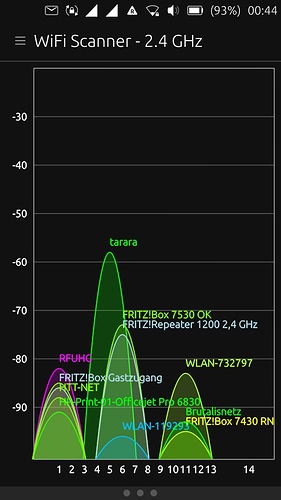I have on my Ubuntu cellphone some app which shows the Wifi bands, used channels, signal strenght and AP SSIDs. Is there something similar for my L5?
LinSSID and Wifi Radar come to mind but neither seems to be working. First installs but does not launch, second is not even available in latest dabian. Both seem to be a few years old, not updated.
Through apt I found a package horst => Highly Optimized Radio Scanning Tool, which seem to habe a command line interface (CLI). This is what apt has to say about it:
Package: horst
Version: 5.1-2
Priority: optional
Section: net
Maintainer: Antoine Beaupré anarcat@debian.org
Installed-Size: 156 kB
Depends: libc6 (>= 2.17), libncurses6 (>= 6), libnl-3-200 (>= 3.2.7), libnl-genl-3-200 (>= 3.2.7), libtinfo6 (>= 6)
Homepage: GitHub - br101/horst: “horst” - lightweight IEEE802.11 wireless LAN analyzer with a text interface
Download-Size: 64.4 kB
APT-Sources: http://repo.pureos.net/pureos byzantium/main amd64 Packages
Description: Highly Optimized Radio Scanning Tool
horst is a small, lightweight IEEE802.11 WLAN analyzer with a text
interface. Its basic function is similar to tcpdump, Wireshark or
Kismet, but it’s much smaller and shows different, aggregated
information which is not easily available from other tools. It is
made for debugging wireless LANs with a focus on getting a quick
overview instead of deep packet inspection and has special features
for Ad-hoc (IBSS) mode and mesh networks. It can be useful to get a
quick overview of what’s going on all wireless LAN channels and to
identify problems.
.
- Shows signal (RSSI) values per station, something hard to get,
especially in IBSS mode- Calculates channel utilization (“usage”) by adding up the amount of
time the packets actually occupy the medium- “Spectrum Analyzer” shows signal levels and usage per channel
- Graphical packet history, with signal, packet type and physical rate
- Shows all stations per ESSID and the live TSF per node as it is
counting- Detects IBSS “splits” (same ESSID but different BSSID – this is/was
a common driver problem on IBSS mode)- Statistics of packets/bytes per physical rate and per packet type
- Has some support for mesh protocols (OLSR and batman)
- Can filter specific packet types, operating modes, source addresses
or BSSIDs- Client/server support for monitoring on remote nodes
- Automatically adds and removes monitor interface
.
horst is a Linux program and can be used on any wireless LAN interface
which supports monitor mode.
And I also thought of kismet. IIRC it also has a CLI. Looks like it has got a new web UI:
https://kismetwireless.net/development/kismet_webui_tour/
I looked for more GUIs for kismet and found these:
Both doesn’t look like they were optimized to mobile usage or convergence.
I tried kismet years ago. I can’t say to much about it and I also did not try horst, yet.
Yes sure, airodump-ng
The app in the Ubuntu cellphone (ubports.com) is wifi scanner and I’m attaching its screen:
I have iw installed on my Librem 5 (package iw).
Example might be:
iw dev wlan0 scan | grep -E '^BSS|freq:|signal:|SSID:|primary channel:'
assuming that your wireless card is wlan0 and depending of course on exactly what information you want to display. (iw ... scan gives a lot of output, much of which is over my head.)
If only Canonical hadn’t had to come up with their custom set of UI building blocks on top of QtQuick (well, they were early users, so they had to, to be fair), this app would be relatively easy to port over. I think I actually almost managed to run it way back when on my PinePhone when after I had compiled the necessary Ubuntu Touch specific building blocks.
To my knowledge, nothing similar that works exists, but since this is just a graphical representation of the numbers iw can show you, you can somehow work around this - it’s just harder.
I just use an alias on my bashrc
alias wifimon=“watch ‘nmcli -f “CHAN,BARS,SIGNAL,RATE,SSID” d wifi list ifname wlan0’”
Did you try to run LinSSID from the terminal with the command sudo -E linssid ?
Works fine for me.
Gives:
purism@pureos:~$ sudo -E linssid
qt.qpa.xcb: could not connect to display
qt.qpa.plugin: Could not load the Qt platform plugin "xcb" in "" even though it was found.
This application failed to start because no Qt platform plugin could be initialized. Reinstalling the application may fix this problem.
Available platform plugins are: eglfs, linuxfb, minimal, minimalegl, offscreen, vnc, xcb.
Aborted
Looks like missing dependencies. Try installing qtwayland5:
sudo apt install qtwayland5
You might also need to set QT_QPA_PLATFORM=wayland before launching LinSSID
export QT_QPA_PLATFORM=wayland
sudo -E linssid
